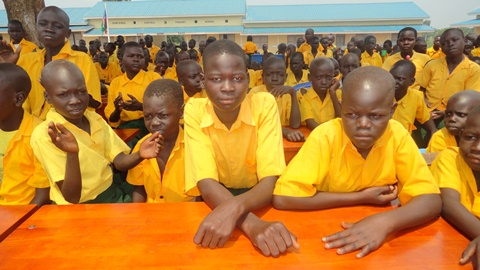S. Sudan launches campaign to reduce high illiteracy rates
September 7, 2012 (JUBA) – South Sudan, on Friday, officially launched a nationwide campaign as part of the “education for all programme”, seeking a 50 percent reduction in adult illiteracy among its population by 2015.

The initiative was announced during a two-day national literacy conference organized by the country’s education ministry, in collaboration with United Nations Educational, Scientific and Cultural Organization (UNESCO).
Joseph Ukel Abango, South Sudan’s Minister for General Education and Instruction said the government recently initiated a general education strategic plan, which aims to reduce the high illiteracy rates in the young nation.
“Illiteracy can easily be overcome though political and social campaigns involving all stakeholders in the country as stipulated in South Sudan’s Transitional Constitution,” said Abango at the conference held in Juba, the South Sudan capital.
South Sudan, according to its 2009 Household Survey report, has one of the highest illiteracy rates in the world. Only 27 percent of those aged 15 and above are said to be literate.
An estimated 80 percent of people in South Sudan are unable to read and write, according the, South Sudan National Bureau of Statistics.
Women in South Sudan, are the worst effected with just 19 percent of South Sudanese women aged 15 and above reportedly literate.
“We still have serious challenges to tackle,” the minister acknowledged, adding that the much-hyped education for all programme, should encompass all South Sudanese, including pastoralist communities.
South Sudan has now initiated an education system involving the use of pastoralists’ teachers, who move from one cattle camp to another, educating pastoralists on the importance of having an educated society.
The South Sudan National Assembly recently passed the long-awaited General Education Bill, which among other provisions considers the English language as the acceptable medium of instruction in all schools in the country. Previously, syllabuses in the country were taught in Arabic.
Meanwhile, UNESCO has pledged US$0.5m to enhance literacy campaigns in
South Sudan; a country what suffered decades of civil wars, which massively destroyed its infrastructures, including schools, tertiary and technical institutions.
Salah Khaled, UNESCO’s head of office in South Sudan urged the government to consider education as the country’s most vital priority, since it attained independence last year.
“Literacy should involve all stakeholders in the country, regardless
of status in society,” Khaled said during the conference, while pledging UNESCO’s firm commitment to closely work with the education ministry in the implementation of the general education strategic plan.
He, however, said the two-day conference should be used as a platform to reflect on the human dimensions illiteracy can have on the population in society.
Telar Riing Deng, South Sudan’s presidential advisor on legal affairs described lack of education as an enemy, which keeps a nation in the past.
“Illiteracy is the enemy within. We have to promote literacy that ensures the culture of peace in our societies,” he said, while speaking on behalf of South Sudan President, Salva Kiir.
South Sudan should focus on building a nation of peace and tolerance, while focusing on education systems that provide opportunities for self-actualization of citizens, he said.
(ST)
